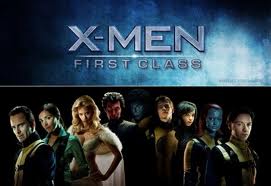Film Review: X-Men First Class

X-Men: First Class addresses the question that has troubled humanity for decades: what if the tensest confrontation of the Cold War era was in fact a proxy battle between mutants?
Maybe not, but this fifth installment of the lucrative franchise takes us to the beginning of the X-Men story, to a time when mutants were not organized into competing teams but rather roamed the earth as free agents, unaware of the extent of their powers or the degree to which they could contribute to (or even manipulate) competing sides in the Cold War.
The film begins with a young Erik Lensherr (played by Bill Milner as a child and Michael Fassbender as an adult) in a Nazi concentration camp, discovering his ability to manipulate metal. An attempt by a sadistic Nazi scientist Dr. Schmidt (Kevin Bacon) to force young Erik to demonstrate the ability leads to Schmidt’s cold-blooded killing of Erik’s mother. The adult Erik’s desire for revenge becomes his raison d’être for the rest of the film.
In contrast, Charles Xavier (James McAvoy) has a cushy, almost hedonistic time at his home in Westchester and at Oxford University, where he earns a doctorate in mutantology and becomes the world’s foremost expert on the subject. This expertise draws the interest of the CIA, and soon he is helping U.S. intelligence agents build up an army of mutants from around the globe in order to fight the powerful and manipulative Schmidt, who now trots the globe under the identity of Sebastian Shaw and has a scheme to leave the planet in smoking ruin.
Being a prequel, X-Men: First Class contains all of the sequences that viewers of prequel films, from The Phantom Menace to Batman Begins, would expect. Xavier assembles the mutants he recruits into a training camp, where they struggle to hone their abilities under his guidance. Some viewers (present company included) may find this portion of the film tedious, as the plot advances little even as the gears turn into place, and there are so many characters that none of them really develop in the eyes of the audience beyond whatever special ability they hold. As the film went on, I found myself more and more indifferent to their fates, with the exception of Erik, whose compellingly tormented quest to avenge his mother’s death makes him the standout of the film.
Along the way, the film touches on a variety of humanist themes, although at times the treatment is maddeningly superficial. Characters struggle with the fact that they’re different, with two in particular exploring how they can permanently alter their appearances so that they no longer stand out as mutants. But this also leads to many affirmations of mutant identity–at one point, a character exclaims that, rather than the mutants aspiring to be more like society, “society should aspire to be more like us.”
Humanists who have been ostracized for their non-belief may be able to relate closely to that sentiment (and the film, indeed, draws upon language and imagery from both the civil rights and the LGBT rights movements in order to make the parallels clear). But the film is too anxious for the final fiery confrontation to fully explore these gentler themes in depth, and it also undermines its message at times by treating characters played by minority actors in the same, tired ways that so many films have in the past (such as the troubling trope of killing black characters early in the film).
Fans of the X-Men franchise will find plenty to please them in this latest installment, while summer blockbuster-seekers will be happily entertained. Seekers of a deeper humanist message, though, may find themselves a little undernourished.
